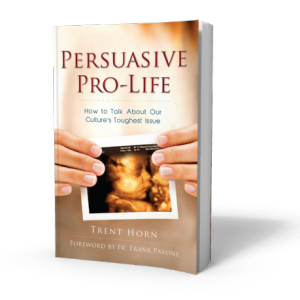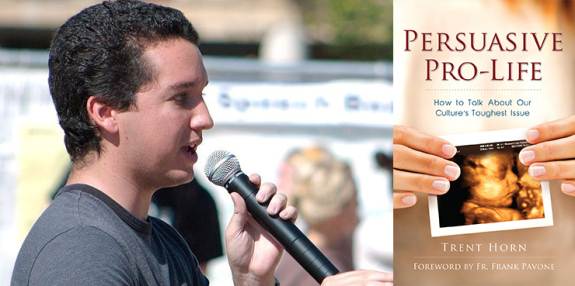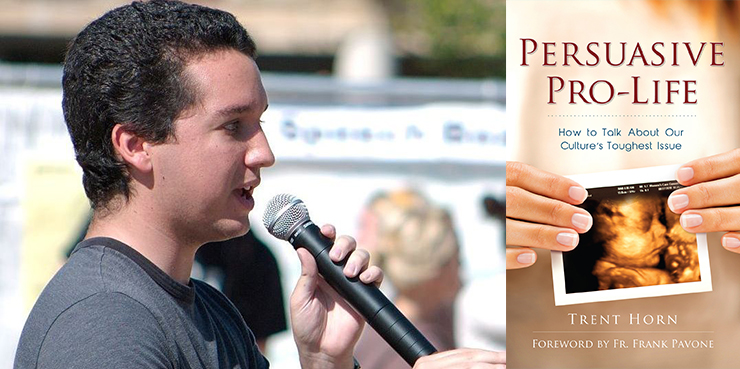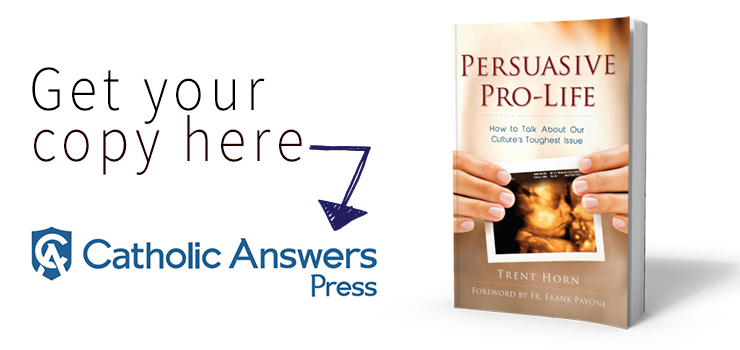For years, Trent Horn repeatedly did something that would terrify most of us:
He discussed a controversial issue, with total strangers, in open squares on college campuses.
As part of the “Justice For All” pro-life movement, he travelled the country and had open-air debates about abortion. Here’s a short sample clip of him in action:
After sharing hundreds of conversations, Trent developed a keen sense for the most common objections to pro-life views, and he also learned the most effective replies. Trent recently compiled all of this expertise into a magnificent new book, Persuasive Pro-Life: How to Talk About our Culture’s Toughest Issue (Catholic Answers, 2014.) While many pro-life books lean on heavy philosophy or theory, Trent’s book is eminently practical. He shows you through real world dialogues how to respond to the most common pro-abortion arguments today.
Trent recently sat down with me to discuss the book, including why he wrote it, how engaging pro-abortion advocates is similar to engaging atheists, and how to respond to the strongest argument for abortion.
BRANDON: What compelled you to write Persuasive Pro-Life? What sets it apart from other pro-life books?
TRENT HORN: I wrote Persuasive Pro-Life because there were no books about defending the pro-life position that were written with Catholic laypeople in mind. Many books on abortion from a pro-life perspective simply decry how bad the situation is or they offer soundbite answers to pro-choice arguments. The ones that offer a comprehensive approach often have implicit or even explicit endorsements of Protestant theology so they aren’t helpful for my Catholic audiences. I also feel these books lack the nuance that is needed in real-world conversations.
In contrast, the books on defending the pro-life view written by Catholic authors, such as Frank Beckwith’s Defending Life, Pat Lee’s Abortion and Unborn Human Life, and Christopher Kaczor’s The Ethics of Abortion, were great philosophical works but they aren’t written for a lay audience so they can be overwhelming for the average reader.
What makes my book unique is that I have set out a “road map” for conversations about abortion and use field-tested techniques to simplify the issue and help pro-lifers answer both common and sophisticated objections. Readers will enjoy following along the many conversations I’ve had on this issue on both public university campuses and on the radio as part of my regular call-in show with Catholic Answers Live called Why are you pro-choice? where we let self-described pro-choice advocates engage me in dialogue on live radio.
BRANDON: You’ve established yourself as an expert on atheism after writing a definitive Catholic response titled Answering Atheism: How to Make the Case for God with Logic and Charity (Catholic Answers, 2013). Do you find similarities engaging atheists about God and pro-abortion supporters about life?
 TRENT: Yes, in both cases I find that the other person simply assumes their position is true without actually defending it. For example, atheists will frequently say that if I can’t prove that theism is true then that means atheism is true. But historically atheism is not just a lack of belief in God but the denial of God’s existence, so the failure to prove God exists does not mean one has proven he does not exist. Even if atheism were just a “lack of belief” that would be uninteresting unless it were coupled with a positive claim like “There are no good reasons to think God exists.”
TRENT: Yes, in both cases I find that the other person simply assumes their position is true without actually defending it. For example, atheists will frequently say that if I can’t prove that theism is true then that means atheism is true. But historically atheism is not just a lack of belief in God but the denial of God’s existence, so the failure to prove God exists does not mean one has proven he does not exist. Even if atheism were just a “lack of belief” that would be uninteresting unless it were coupled with a positive claim like “There are no good reasons to think God exists.”
The same happens with pro-choice or pro-abortion advocates. They already assume abortion is a “harmless choice” or “woman’s right” and so they ask questions like, “Shouldn’t we keep abortion legal so that it’s safe?” or “How can you impose your view that life begins at conception onto other people?” They don’t realize that they assume their view is correct and discount the idea that abortion is never safe since at least half the people involved in the procedure die (i.e. the unborn children). Also, pro-choice advocates may chide pro-lifers for imposing the view that human organisms generally begin to exist at conception (a small minority begin at twinning), but they impose the view that humans don’t have rights until birth. Everyone “imposes” the view that life begins at some point, the question is whose position is backed by the evidence? My book argues that it is the pro-life view.
So yes, there are similarities in that one side thinks that if they refute the other then their view automatically wins by default, but there are differences. It’s important to remember that there are some atheists who are pro-life such as members of the group Secular Pro-life and Christians who are pro-choice like the Religious Coalition for Reproductive Choice.
BRANDON: What are some simple tips for discussing the abortion issue charitably and fruitfully?
TRENT: Try to ask more questions instead of making lots of statements. Specifically, questions like “What do you think about abortion?” and “Why do you think that?” Instead of hitting the other person over the head with your opinion you can have a calmer more powerful discussion by asking the right questions that get the person to -re-think the whole issue.
Also, just try to be normal and empathize with people. For example, when the issue of abortion in the case of rape comes up, don’t launch into a speech about how rare the situation is but just acknowledge how terrible such a situation is! My old mentor Steve Wagner used to say, “Before people will believe the unborn are human, they have to believe YOU are human!”
BRANDON: In the book you describe many types of pro-abortion opponents or inquirers. What should we know about each type?
TRENT: In my book I talk about ten different types of pro-choice advocates, not by demographics like age or race, but by the kind of arguments they use to defend their position. All of them can be boiled down to about three types of people:
1. Those who ignore the question of the unborn: These pro-choicers say abortion should be legal because it helps women or is a civil right. They completely sidestep the question of what abortion does to the unborn so you need to charitably get them back to that central issue.
2. Those who say the unborn don’t matter: These pro-choicers say the unborn are not human, not persons, or simply don’t have a right to live in their mother’s bodies. What’s good about these advocates is that they understand that the moral status of the unborn is the central issue in this debate. For them, you’ll need to use science to show that the unborn are living human organisms and philosophy to show them that there are no morally relevant differences between unborn human organisms and born human organisms.
3. Those with tough questions: This last group may implicitly accept that the unborn are fully human but they get bogged down with tough situations like abortion in the case of rape. You’ll need to compassionately explain that even in these tough situations violence against unborn humans is not morally justified.
BRANDON: What do you consider to be the strongest argument for abortion and how would you respond?
TRENT: The strongest argument for abortion grants as many premises to the pro-life advocate as possible. Bodily rights arguments, which grant that unborn children could be human beings with a right-to-life, but deny the unborn have a right to use their mother’s body to live, are the strongest argument for abortion.
However, these arguments either rest on controversial premises that are certainly false (“I can do whatever I want with my body”) or they use analogies that are fatally dis-analogus to pregnancy (being forced to donate an organ to save someone’s life).
I have a whole chapter in my book dedicated to pointing out the flaws in these kinds of arguments for abortion.
BRANDON: If you had thirty seconds with a pro-abortion advocate, what would you say to change their mind?
TRENT: I would ask them to explain to me what’s wrong with the view that all human organisms should have the basic right to live and since the unborn are living human organisms, then why shouldn’t we give them that same basic right to live? Why should we believe that smaller, less developed, and more dependent humans don’t deserve to live?
Hopefully, by showing them that there is no morally relevant difference between born and unborn humans, the person will begin to question the morality of abortion.
Find out more about Trent Horn by visiting his website, TrentHorn.com. And be sure to pick up your copy of his new book, Persuasive Pro-Life: How to Talk about Our Culture’s Toughest Issue:
If you liked this discussion you’ll find several more on my Interviews page. Subscribe free via feed reader or email and ensure sure you don’t miss future interviews.



